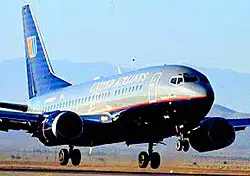
The U.S. Department of Justice (DOJ) has signed off on the merger between United and Continental, saying it has no antitrust concerns regarding the deal.
No doubt that a deal announced Friday, in which Continental will lease 36 slots at Newark to Southwest, played a role. Newark is a major hub for Continental, and the DOJ was reportedly concerned that the merger could result in reduced competition at such a large, international airport. Bringing in Southwest, which presently doesn’t serve Newark, was apparently enough to satisfy the government.
As for the merger, both sides can now proceed toward closing the deal. Both sets of shareholders need to vote, and are scheduled to do so September 17. The Department of Transportation (DOT) also needs to give its OK, as do several state attorneys general. The airlines are hoping to close the deal October 1.
Once the deal closes, the airlines will fly separately under a common parent company until the Federal Aviation Administration (FAA) issues a new flight certificate for the combined carrier. That should take no more than 18 months.
Perhaps the most interesting aspect of the DOJ review is that it appeared so easy. Many expected the Justice Department to hammer United and Continental, but the merger has moved ahead smoothly since being announced this spring. The airlines were able to convince the DOJ that there is little route overlap between them, meaning consolidating shared routes will have a minimal impact on prices and competition.
That said, many in the government see the United-Continental merger as a major blow to fairness in the industry. Congressman James Oberstar, who chairs the House Committee on Transportation and Infrastructure, said in a statement, “[The DOJ’s approval] points strongly to the need to give broader authority over such mergers to the Department of Transportation, allowing DOT to consider such factors as the impact a merger will have on service to communities and customers, as well as the effect the merger could have on the industry as a whole. There must be consideration of whether a merger will inevitably trigger others, ultimately reducing the industry to a few large carriers, each of which is unwilling to compete seriously in markets dominated by one of the others.”
He also suggested Congress should consider re-regulating the airlines: “This consolidation of the mainline companies into three or four mega-carriers is not what I voted for in 1978. Nor did anyone foresee three international alliances dominating the global airline market.”
Once United and Continental are merged, consolidated mega-carriers Delta and United will account for 40 percent of the domestic air travel market.
Readers, how do you think the merger, which now seems rather inevitable, will change the industry?
We hand-pick everything we recommend and select items through testing and reviews. Some products are sent to us free of charge with no incentive to offer a favorable review. We offer our unbiased opinions and do not accept compensation to review products. All items are in stock and prices are accurate at the time of publication. If you buy something through our links, we may earn a commission.
Related
Top Fares From
Today's Top Travel Deals
Brought to you by ShermansTravel
Kenya: 14-Night Tour, Incl. Tanzania &...
smarTours
 vacation
$7125+
vacation
$7125+
7-Night Caribbean Round-Trip Cruise From Orlando:...
Norwegian Cruise Line
 cruise
$789+
cruise
$789+
Ohio: Daily Car Rentals from Cincinnati
85OFF.com
 Car Rental
$19+
Car Rental
$19+



